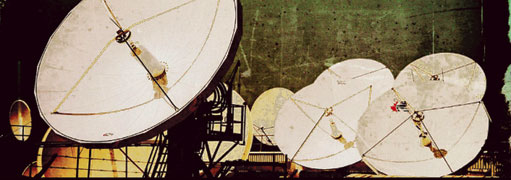A decade ago, Facebook was still more than two years away from its debut, and Twitter was going to take almost five to hit the scene. Even MySpace wasn’t up and running until 2003, and nobody used that social networking grandpa for information the way we use Facebook and Twitter now. Most people learned of the attacks from the 24-hour news channels, the radio and the papers. Despite the fact that major social networking sites weren’t available then, 9/11 is when I realized how important personalized Internet was going to be for me.My diary entry from that day includes this gem: "It’s like when Kennedy was shot. Nobody knows what’s going on or who did it. It’s just panic."There’s a scene in the third season of “Mad Men” that takes place on the afternoon Kennedy was assassinated. Don Draper walks out of his office to a reception area filled with ringing phones and a cluster of secretaries in one corner, watching the TV for news. The secretary closest to him is on the phone. Suddenly, all the phones in the office stop ringing, and the secretary is left trying to regain the call she’s just lost. That scene, filmed post-9/11, perfectly captured the eeriness around me that September day when the phones were dead. I was a sophomore at Georgetown in Washington, D.C. I was walking to my morning Chinese class when the first plane hit the Pentagon—just five miles from the university. I didn’t find out about what was happening until after my class was over. Everyone was saying the National Mall was on fire and we’d been bombed. I spent most of the ensuing hours working in the student-run coffee shop, watching people freak out because you couldn’t get a call through on a landline or a cell phone. Our parents in California, New York, Texas, Alabama and New Mexico had no idea if we were under fire somewhere near the Pentagon or fine in our dorm rooms. Cell phones simply did not work; landlines gave you a "We’re sorry, we cannot complete your call at this time." I couldn’t find my roommates, one of whom was a Manhattanite, the other from Brooklyn. I had no way to reach them. They didn’t come by the coffee shop, which was a major gathering place, especially since we had a landline that would sporadically get a call through. I filled in all afternoon, working three times my scheduled shift to let co-workers from New York get other things done. We gave free coffee to doctors from Georgetown Hospital, who were taking blood donations between dealing with triage from the Pentagon. We gave our tips to the Red Cross. Halfway through my shift, I slipped out to go home and change. I had been dressed for ’80s day, not 12 hours of dealing with chaos. I needed more comfortable shoes. My parents were back in my hometown of Albuquerque, and I knew they were probably worried about me. But my cell phone wouldn’t even give me a dial tone, and the landline in my apartment was useless. I ran up the steps to my room, opened my laptop and typed a message via AIM to my friend Will in Albuquerque, who, at my instruction, called my dad to let him know I was OK. Looking up and down my buddy list, I realized everyone’s status message was along the lines of, I’m all right. It was the only way we had to let people know where we were or what was going on. I realized how much I took the Internet for granted, and how important it was going to be for us, especially during disasters or tragedy. This month, D.C. residents and New Yorkers took to Twitter and Facebook to let people know they were feeling the earthquake. Tweets from the epicenter traveled faster than the tremors. The Jasmine Revolution in the Middle East was organized by these media. And a few months ago, I found out about the death of Osama bin Laden before the news announced it, thanks to Facebook and a text from that same friend, Will. We forget sometimes how quickly personal triumphs and tragedies can be transmitted through social media—the birth of a child, an engagement, the death of a parent, a major natural disaster. These can all be communicated to hundreds of friends at once without having to dial a single number. I will never forget how grateful I was that I had the Internet and an instant messenger. Strolling back to my apartment from the coffee shop that weird September evening, my cell phone came back to life, and I got to hear the myriad messages from my friends around the country hoping I was OK. Since then, phone lines have continued to get just as jammed whenever disaster strikes. Instead of having to worry through the silence, I am relieved to know that my loved ones can get immediate notice that I’m fine: 9/11 cemented my attachment to online communication.
Kat Cox is a writer in Albuquerque. She pens the “Ask Kat Curious” advice column for the Alibi .The opinions expressed are solely those of the author.



